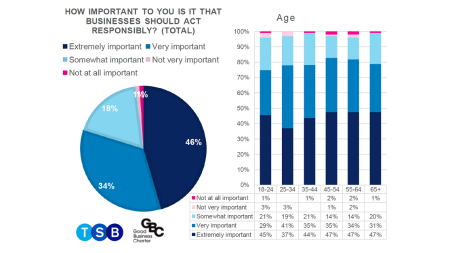Consumers Need Help to Judge Business Behaviour
Consumers need help to judge business behaviour
· New research from the Good Business Charter and TSB has highlighted how consumers are struggling to judge whether businesses are living up to the right standards.
· While 97% of UK consumers expect businesses to behave responsibly, only 25% feel they have enough information to judge brands fairly.
· The research, which was carried out between 25-27 June of over 2,100 consumers, suggests that 89% of consumers would be more likely to change where they shop and buy from based on how a business behaves.
London: 14th July 2021
An overwhelming majority of UK consumers now expect businesses to act responsibly – but only a quarter feel they have the right information to judge how businesses behave, according to new research published today by the Good Business Charter (CBC) and TSB.
The findings show that only 3% of UK consumers feel that responsible business practices aren’t important – compared to 97% who say the way businesses behave matters to them. Significantly, the strength of opinion is shared across generations and backgrounds, with only minor differences between men, women, age groups and income, underlining that ethical considerations are now a mainstream concern.
In another signal of the shift in public expectations, a growing number say they would actively change the way they shop and the brands they buy from if they knew a business behaved irresponsibly. 45% of consumers already avoid brands that act irresponsibly and 89% said they would be more likely to switch brands if they knew a brand was acting irresponsibly.
However, many consumers feel they don’t have enough information to form the right judgments about businesses. Only 25% of consumers feel they have enough information to decide whether a business is behaving responsibly, while over half of consumers, 51%, agree that a single logo from an independent body would help to make that decision.
The findings raise further questions about how the business world responds to heightened consumer expectations around behaviour. Although a range of think tanks and charities provide independent, third-party accreditation on specific issues, the need is growing for a single, nationally recognised logo, awarded independently by one established body, which signals whether businesses abide by common standards and values.
Commenting on the findings, Julian Richer, founder of the Good Business Charter, said:
“It’s no surprise people are baffled. There’s a growing gulf between the worthy words of many business leaders, and the reality! And how are the public to judge whether organisations do what they claim to do?
“The main reason we set up the Good Business Charter was to fix this by providing a simple, all-encompassing certification scheme, confirming that a business acts responsibly, so that concerned consumers can have a clear guide of which to support.”
Debbie Crosbie, CEO of TSB, added:
“In banking, we already know customers want clearer communication to give them confidence in managing their money. They also want the same clarity when deciding who they spend their money with – and confidence that brands are meeting their expectations on basic issues such as employee pay, tax contribution and fair treatment of suppliers.
“We see the success of Fairtrade as our benchmark for businesses to work to high ethical standards and provide their customers with a clear, simple logo, like the Good Business Charter.”
The results come as the GBC celebrates 600 organisations signing up, and York becoming the first GBC city.
TSB, which is the first high street bank accredited by the GBC and which has supported the research, has committed to displaying the logo prominently in its branches and on its website. It is also working with the GBC to help its small business suppliers sign up.
Notes to editors:
· The research was conducted by Savanta ComRes of 2,148 adults between 25-27 June, 2021.
· The research examined consumers’ views on the importance of business behaving responsibly and whether this would affect their decision to deal with that business. It looked at various aspects of responsible business including: paying a fair share of tax, treating suppliers fairly, diversity of the workforce, ethical sourcing practices and fair employment practices.
The Good Business Charter The Good Business Charter was developed in partnership with the Confederation of British Industry, the Trades Union Congress and Federation of Small Businesses. Organisations signed up to the Charter have agreed to ten key commitments:
● Real Living Wage
● Fairer Hours and Contracts
● Employee Well-being
● Employee representation
● Diversity and inclusion
● Environmental responsibility
● Pay fair tax
● Commitment to customers
● Ethical sourcing
● Fair payment to suppliers
TSB Bank
TSB is a UK retail bank with a trusted customer brand and heritage stretching back to the start of the savings bank movement 200 years ago. TSB offers full retail banking to more than five million
customers, online, digitally, via phone and through our branch network. In August last year we launched our Do What Matters Plan, which commits to creating social and environmental, as well as economic value.
Further info:
For Good Business Charter Jenny Herrera, CEO | 07703 453 862 | jherrera@goodbusinesscharter.com
For TSB
Joseph Eyre, Senior Media Relations Manager
T: 07483 432546 / 0207 003 9369 | joseph.eyre@tsb.co.uk
Follow us on twitter: @TSB_News

